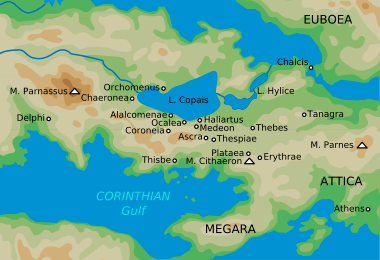Alalkomenes, Boeotia
Alalkomenes (Greek: Αλαλκομενές; before 1928: Μαμούρα Mamoura[1]) is a village and a community in the municipality of Livadeia, Boeotia, central Greece. It is situated in a wide plain, 6 km northeast of Koroneia, 10 km east of Livadeia and 30 km west of Thebes. The community Alalkomenes consists of the villages Alalkomenes and Agios Athanasios. The population of the community was 178 in 2011.[2]
Population
| Year | Population[3] |
|---|---|
| 1835 | 127 |
| 1861 | 183 |
| 1879 | 126 |
| 1889 | 143 |
| 1896 | 186 |
| 1907 | 154 |
| 1920 | 253 |
| 1928 | 310 |
| 1940 | 476 |
| 1951 | 409 |
| 1961 | 435 |
| 1971 | 303 |
| 1981 | 296 |
| 1991 | 324 |
| 2011[2] | 178 |
History

Alalcomenae (Ancient Greek: Ἀλαλκομεναί - Alalkomenai) was an ancient town on the south-west bank of Lake Copais (drained in the 19th century), west of Haliartus. Stephanus of Byzantium refers to the town by the name Alalkomenion.
In antiquity Alalcomenae was famous for a temple to the goddess Athena Alalcomeneis.[4] The epic poet Homer twice refers to her as Alalkomenean Athene (Ἀλαλκομενηῒς Ἀθήνη).[5] The town was by a hill which Strabo calls Mount Tilphossius (named for Telphousa, the spring visited by the god Apollo). Strabo also records that the tomb of the seer Teiresias, and the temple of Tilphossian Apollo, were located just outside Alalcomenae.[6]
Ancient sources preserve three accounts of the origin of the town's name:
- Stephanus of Byzantium and the geographer Pausanias — and probably Homer — preserve the story that it was named after Alalcomenes (or Alalkomenes, in Stephanus), who raised the goddess Athena there.[7]
- Pausanias also records an account that it was named after Alalcomenia, daughter of Ogygus, King of the Ectenes, the people to first occupy the land of Thebes.[8]
- According to Stephanus of Byzantium, the Alexandrian scholar Aristarchus of Samothrace believed the town was named from the Greek verb ἀλαλκεῖν "to protect" (< ἀλέξω), to reflect Athena's role as defender of the town. The early "D" scholia on the Iliad also reflect this account, so the idea may pre-date Aristarchus.[9]
In view of the cult of Athena there, presumably local myth in Alalcomenae followed the first of these theories. Pausanias recalls a story that the Roman general Sulla stole the icon of Athena from the temple, and in revenge Athena sent a plague of lice upon him; but afterwards the temple was neglected.
In 1928 the village Mamoura was renamed Alalkomenes after the nearby ancient town Alalcomenae.[1] The village became a separate community (together with Agios Athanasios) in 1928, when it was split from the community of Vrastamites. In 1997 it became part of the municipality of Koroneia, which merged into the municipality of Livadeia in 2010.[10]
References
- 1 2 Name changes of settlements in Greece
- 1 2 Detailed census results 2011 Archived December 25, 2013, at the Wayback Machine. (in Greek)
- ↑ Population history of Livadeia Province 1835-1991, sum of the localities Alalkomenes and Agios Athanaios.
- ↑ Schol. D on Iliad 4.8, Pausanias 9.33.5, Stephanus of Byzantium 68 s.v. Ἀλαλκομένιον.
- ↑ Iliad 4.8, 5.908.
- ↑ Strabo 9.2.27, 9.2.36.
- ↑ Pausanias 9.33.5; Stephanus of Byzantium 68 s.v. Ἀλαλκομένιον.
- ↑ Pausanias 9.33.5.
- ↑ Stephanus of Byzantium 68 s.v. Ἀλαλκομένιον, schol. D on Iliad 4.8, 5.908.
- ↑ EETAA local government changes